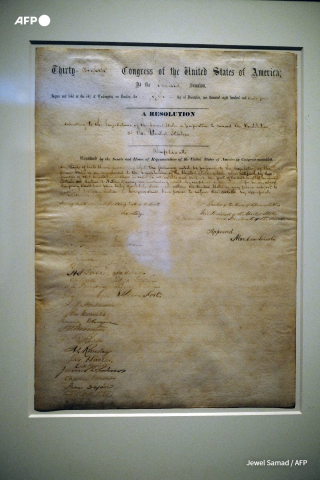From slavery to the White House

This chronology of the United States' struggle for civil rights for blacks was published by Agence France-Presse upon the 2008 election of Barack Obama as the first black US president.
WASHINGTON, November 5, 2008 (AFP) - Key dates in the history of African-Americans in the United States leading up to Tuesday's historic election of Barack Obama as the country's first black president:
- 1619: The first African slaves are landed in the English colony of Virginia. Slavery is to become a key motor in the development of what will become the United States.
- 1776: American patriots declare independence from Britain in a quarrel over taxes. But there is no dispute over slavery, which is even practised by the new country's first president, George Washington.
- Early 19th century: Slavery and the slave trade are gradually abandoned by most European states.

- Slavery abolished -
- 1861-65 : Slavery, widespread in the Confederate South but generally opposed in the North, is the main issue behind the American Civil War, which ends with victory for the North.
- 1865 : The 13th amendment to the Constitution formally abolishes slavery. The Ku Klux Klan, a violent white supremacist secret society, is founded.
- 1896 : A Supreme Court ruling authorizes racial segregation, a widespread practice in the southern states. Saying the races may be "separate but equal", the ruling allows so-called "Jim Crow" discrimination laws.
- 1909 : Foundation of the National Association for the Advancement of Colored People (NAACP).
- 1941-45 : African-Americans fight for the United States in World War II but generally in separate units.
- 1949 : A presidential decree formally ends segregation in the armed forces.
- First desegregation rulings -
- 1954 : The Supreme Court outlaws segregation in schools.
- 1955 : A black civil rights activist, Rosa Parks, sparks a mass movement by refusing to give up her seat to a white person in an Alabama bus. Rise to prominence of Martin Luther King, a charismatic civil rights leader.
- 1957 : Congress enacts the Civil Rights Act, guaranteeing all black people the right to vote. But it remains a dead letter in many southern states.
- 1960 : An amendment to the Civil Rights Act introducing penalties for anyone who obstructed someone's attempt to register to vote or vote.
- 1963 : At the apogee of the civil rights movement, which has seen serious violence is many parts of the country, Martin Luther King addresses 200,000 people in Washington, DC.
"I have a dream that my four little children will one day live in a nation where they will not be judged by the color of their skin," he declares.
- 1966 : Radical activists in California found the Black Panther Party.
- Martin Luther King killed -
- 1968 : Martin Luther King is assassinated, and race riots shake the country. Athletes taking part in the Olympic Games in Mexico give "black power" salutes.
- 1989 : Colin Powell becomes the first African-American to head the US armed forces. He goes on to become the first black secretary of state.
- 1992 : Race riots sparked by the beating of a black motorist by police leave at least 59 people dead in Los Angeles.
- 1995 : A rally organized by the Nation of Islam attracts some 800,000 African American men to Washington.
- 2005 : Condoleezza Rice becomes the first black woman to serve as secretary of state.
- 2008 : Barack Obama, a Democratic senator from Illinois, becomes the first African-American elected president of the United States.
